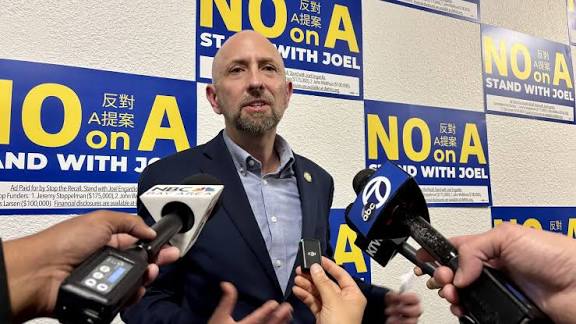In a landmark decision, San Francisco’s District 4 voters overwhelmingly chose to recall Supervisor Joel Engardio in September 2025. The Joel Engardio recall results shocked many across the city and even drew national attention, as it marked the first time in San Francisco’s history that a sitting supervisor was removed by recall. The recall wasn’t just about one politician; it was a referendum on how local leaders balance citywide environmental policies with neighborhood concerns.
Breaking Down the Recall Results
On September 16, 2025, nearly two-thirds of District 4 voters supported recalling Engardio. Early results showed:
- Yes (Remove Engardio): ~65%
- No (Keep Engardio): ~35%
- Total registered voters in District 4: About 50,000
- Turnout: Approximately 30–35% in early mail-in returns, with final turnout projected higher
The San Francisco Standard reported that this decisive margin highlighted a deep rift between citywide sentiment and neighborhood-level opposition to key policies, especially Proposition K.
Why Was Joel Engardio Recalled?
The Joel Engardio recall wasn’t triggered by corruption scandals or personal controversies—it was driven by policy disagreements, most prominently his support for Proposition K.
Proposition K and Sunset Dunes
Proposition K, passed citywide in 2024, permanently closed a two-mile stretch of the Great Highway to cars, converting it into the Sunset Dunes park. While the measure narrowly passed across San Francisco (≈55%), District 4 residents rejected it by a landslide, with over 64% voting against.
For many Sunset and Parkside residents, the closure caused traffic congestion on alternative routes, longer commute times, and concerns about coastal access. Engardio, who once signaled support for a compromise (open weekdays, closed weekends), was seen as betraying that promise when he backed the full closure.
Housing and Rezoning Policies
Engardio also aligned with Mayor Daniel Lurie’s rezoning initiatives, which aimed to allow denser housing in suburban-style neighborhoods. Critics argued that while San Francisco needs housing, the Sunset District wasn’t the right place for high-rise development due to infrastructure and traffic concerns. His “urbanist” stance alienated homeowners and renters alike.
Perceptions of Broken Promises
Many recall supporters accused Engardio of “misleading” constituents during his 2022 campaign. While he branded himself as a moderate who would listen to neighborhood voices, recall organizers felt he prioritized citywide agendas over his own district’s majority opposition.
The Historic Significance of the Recall
The Joel Engardio recall results were historically significant for several reasons:
- He became the first supervisor in San Francisco history to be removed by recall.
- It reaffirmed the political power of localized grassroots movements in shaping city policy.
- It highlighted the growing trend of recalls as a tool of accountability—San Francisco has seen recalls of school board members and its district attorney in recent years.
According to San Francisco Chronicle, the Engardio recall could reshape how supervisors approach contentious policies in the future, especially when local opposition is fierce.
Reactions From Stakeholders
Joel Engardio
In his concession, Engardio defended his decisions, especially regarding Sunset Dunes. He argued that climate adaptation and open space are essential for the city’s long-term resilience. He described the park as “a success story” despite the backlash.
Recall Organizers
Local leaders of the recall effort, including Sunset district activists, described the vote as “a message of accountability.” They emphasized that elected officials cannot ignore their immediate constituencies in favor of citywide agendas.
City Leadership
Mayor Lurie expressed respect for Engardio’s work but acknowledged that voters had spoken. He now faces the responsibility of appointing an interim replacement to represent District 4 until the next scheduled election.
What Happens Next?
With Engardio recalled, here’s what’s ahead:
- The Department of Elections will certify results within weeks.
- Mayor Lurie will appoint an interim supervisor for District 4.
- The seat will be contested again in the regular election cycle (expected June 2026).
Importantly, the Sunset Dunes park created by Proposition K is not automatically reversed by this recall. Rolling it back would require another ballot measure. Thus, while Engardio is out, the park remains—for now.
Broader Implications for San Francisco Politics
Growing Use of Recalls
The Engardio recall adds to a growing list of successful recall campaigns in San Francisco. Critics argue that frequent recalls destabilize governance, while supporters say they empower voters to demand accountability.
Policy vs. Representation
This recall underscores the tension between citywide policy priorities (environment, housing density, transportation) and district-level concerns (traffic, quality of life, neighborhood character). It’s a balancing act future supervisors will need to approach carefully.
Impact on Future Housing and Transportation Plans
Engardio’s removal sends a warning to other supervisors supporting aggressive housing rezoning or transit reforms. They may face pushback if their districts feel ignored.
Perspectives: Supporters vs. Opponents
Not everyone agrees the recall was the right move:
- Supporters argue Engardio betrayed campaign promises and ignored his district’s majority will.
- Opponents argue that recalls waste resources and that long-term planning requires difficult, sometimes unpopular decisions.
The debate reflects a larger philosophical question: Should supervisors act as delegates strictly representing their district, or as trustees making citywide decisions even against local opposition?
Conclusion
The Joel Engardio recall results will echo in San Francisco politics for years to come. While Engardio’s vision for climate adaptation, urbanism, and open spaces resonated citywide, his own constituents felt sidelined. The recall reflects a fundamental truth about local democracy: policy must balance long-term vision with immediate neighborhood concerns.
As San Francisco continues grappling with housing shortages, traffic, environmental change, and governance challenges, the Engardio recall serves as both a cautionary tale and a reminder of the power of grassroots organizing.

